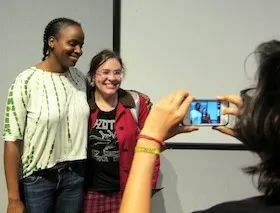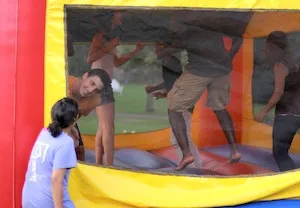Filmmakers Screen, Discuss Award-Winning Pariah on Campus

Members of the Tri-Co and Philadelphia communities recently gathered at Swarthmore to welcome director Dee Rees and producer Nekisa Cooper, the creative minds behind the critically acclaimed film Pariah (2011). Screened as part of Coming Out Week and financed by the College's Sager Fund, the film is a coming-out and coming-of-age story centered on the poetically gifted Alike (pronounced ah-lee-kay) as she faces complicated family, friend, and romantic relationships on the path to discovering and utilizing her own voice.
At an intimate dinner before a packed LPAC screening, Rees and Cooper fielded questions about their filmmaking process and future goals with a warm humor and wit.
"We met at Colgate[-Palmolive]. I was working on toothbrushes," Nekisa Cooper explained with a laugh, "and she was working on toothpaste."
When Rees left Colgate to attend NYU Film School with absolutely no experience in the craft, Nekisa was pessimistic. But as Rees started her work on Pariah - originally a short film before its transformation into a feature-length endeavor - Nekisa also left the corporate world to start a new career as a creative producer. Luckily, the risky venture was a success.
After a Sundance premiere in which the film won an award for excellence in cinematography, it was acquired by Focus Features (co-founded by David Linde '82) and is currently the most widely distributed film by and about an African American lesbian. It won Rees the Breakthrough Director Award at the Gotham Awards as well as the 2011 Cassavetes Independent Spirit Award and GLAAD Outstanding Film Award.
"It's a universal story told through a very specific lens," she says in explaining the purpose and success of her first film.
Patricia White, professor and chair of Film and Media Studies, agrees. "What's really made me happy is not only the number of partners interested in presenting the event," she says, "but just the enthusiasm for the story it tells about finding your own identity in the context of an educational setting. So it seemed to me that the film is very much a youth film and that that resonated across the board."

Students celebrate at the Queernival on Mertz Lawn, the 2012 Coming Out Week kickoff event. (photo by Gabe Benjamin '15)
White, along with Gabe Benjamin '15 of the Swarthmore Queer Union who wrote the funding proposal, were integral in bringing the film and its creators to campus. The event, co-sponsored by the Black Cultural Center, Black Studies, the Intercultural Center, and the Movie Committee, was the culmination of Coming Out Week, an annual celebration of queer identity that has been held at Swarthmore for over 15 years. Other events included chalking, a carnival, and an open mic night featuring Philadelphia poet Kai Davis and OASIS, Swarthmore's spoken word collective.
The Sager Fund, which helped bring this event to campus, was established in 1988 by Richard Sager '73, a leader in San Diego's gay community. To combat homophobia and related discrimination, the fund sponsors events that focus on concerns of the lesbian, bisexual, and gay communities and promotes curricular innovation in the field of lesbian and gay studies.
Regarding the cultural significance of Pariah as a coming-out-film, White noted that, with the exception of the less widely distributed Watermelon Woman (1996, Cheryl Dunye), this film is one-of-a-kind.
"In some ways, when it's the first film, it has to be a coming out film because it in itself if is a coming out," she says.
The passion with which Dee Rees and Nekisa Cooper tell meaningful stories not only transmitted to the quality of their film and its positive College reception, but to the very words they used to describe their struggle against commercialism and continual support of content above all else. At the end of the Pariah screening, Cooper left the impressed and emotionally affected crowd with some advice:
"Believe in the art. Believe in the story you want to tell. Instead of seeing obstacles, see opportunities."



